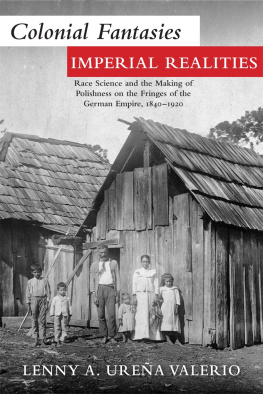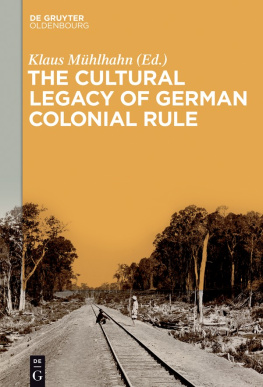Smith - The German Colonial Empire
Here you can read online Smith - The German Colonial Empire full text of the book (entire story) in english for free. Download pdf and epub, get meaning, cover and reviews about this ebook. City: Erscheinungsort nicht ermittelbar;Germany, year: 2009;1978, publisher: University of North Carolina Press Enduring Editions, genre: Politics. Description of the work, (preface) as well as reviews are available. Best literature library LitArk.com created for fans of good reading and offers a wide selection of genres:
Romance novel
Science fiction
Adventure
Detective
Science
History
Home and family
Prose
Art
Politics
Computer
Non-fiction
Religion
Business
Children
Humor
Choose a favorite category and find really read worthwhile books. Enjoy immersion in the world of imagination, feel the emotions of the characters or learn something new for yourself, make an fascinating discovery.

- Book:The German Colonial Empire
- Author:
- Publisher:University of North Carolina Press Enduring Editions
- Genre:
- Year:2009;1978
- City:Erscheinungsort nicht ermittelbar;Germany
- Rating:3 / 5
- Favourites:Add to favourites
- Your mark:
- 60
- 1
- 2
- 3
- 4
- 5
The German Colonial Empire: summary, description and annotation
We offer to read an annotation, description, summary or preface (depends on what the author of the book "The German Colonial Empire" wrote himself). If you haven't found the necessary information about the book — write in the comments, we will try to find it.
Smith: author's other books
Who wrote The German Colonial Empire? Find out the surname, the name of the author of the book and a list of all author's works by series.
The German Colonial Empire — read online for free the complete book (whole text) full work
Below is the text of the book, divided by pages. System saving the place of the last page read, allows you to conveniently read the book "The German Colonial Empire" online for free, without having to search again every time where you left off. Put a bookmark, and you can go to the page where you finished reading at any time.
Font size:
Interval:
Bookmark:
The German Colonial Empire
Copyright 1978 by
The University of North Carolina Press
All rights reserved
Manufactured in the United States of America
ISBN 0-8078-1322-2
Library of Congress Catalog Card Number 77-18155
Library of Congress Cataloging in Publication Data
Smith, Woodruff D
The German colonial empire.
Bibliography: p.
Includes index.
1. GermanyColoniesHistory. 2. GermanyPolitics and government1871-1918. I. Title.
JV2011.S63 325.343 77-18155
ISBN 0-8078-1322-2
Germany acquired her overseas colonies during the period of massive European imperial expansion in the late nineteenth century, and she lost them less than a generation later during the First World War. Taken altogether, the German colonial empire was not inconsiderable. The most important German possessions were four African territories: Southwest Africa, Togo, Cameroon, and German East Africa. In addition, Germany controlled several territories in the Pacific: northeastern New Guinea, part of Samoa, the Bismarcks, the Marshalls, the Carolines, the Marianas, and Kiaochow on the Shantung Peninsula in China. On occasion the German colonies played an important part in the diplomatic history of the pre-1914 era and for brief periods were a major focus for political dispute within Germany. Yet by many obvious standards Germanys short colonial history was unimpressive. In comparison with the overseas possessions of Britain and France, Germanys colonies were small. Even more importantly, they were, with minor exceptions, economically unprofitable. Germanys trade with her colonies was an insignificant percentage of her total commerce, and by most material criteria of imperialist thinking, the German colonial empire was highly unsuccessful.
Nevertheless, the German overseas empire has historical importance. The German colonial expansion of the 1880s helped to set off the partition of Africa among the European powers, an event of obvious significance for African and European history. The German interlude also played an important and complex role in the development of several African countries. This book, which is a summary history of the German colonial empire and of German colonialism, must consider these aspects of the subject, but they do not provide the continuous focus of the study.
This book will instead concentrate on the interaction between the German colonial empire and domestic German politics and, by extension, the connection between colonialism and major socioeconomic problems in Germany in the nineteenth and early twentieth centuries. Within the German political system the colonies created many issues for debate that surfaced during attempts to resolve much more fundamental domestic social disputes. Colonialism was one of the earliest and most important elements of German imperialism, which was itself a result of major social changes in Germany in the nineteenth century. The prime importance of the colonial empire to Germany lay neither with its negligible economic worth nor with its equally negligible strategic value but with its role as a source of political controversy and a means of building support in German politics.
Since German colonialism had at least as much to do with political realities in Germany as it did with the economic and administrative realities of the colonies, colonial policy tended to be framed in terms of German political conceptions and then imposed on colonial territories. This was true, for example, of the period of reform within the German colonial empire after 1906 and of the two quite separate, but equally inappropriate, policies that resulted in massive resistance in Southwest and East Africa in 1904 and 1905. In this way the domestic political aspect of German colonialism had a profound influence on the indigenous societies that made up the overseas empire.
The chapters that follow are intended to serve as a summary history of the German colonial empire and also to indicate some of the more important recent directions in German colonial historiography. The amount of work that has been done on aspects of German colonialism in the past fifteen years has been considerable. It justifies the attempt to gather the various strands of research, including the authors own, into a single brief volume that will, it is hoped, be useful to students of German and African history and at the same time accessible to nonspecialists.
I should like to thank the following people for their advice and assistance at various stages in the preparation of this book: Roger Louis, Lewis Gann, and Sharon Turner, who read the text and offered suggestions; Ralph Austen, who has guided me throughout my studies of German colonialism; Veronica Ibarra and Sandra Rodriguez, who did the typing; H. Pogge von Strandmann and Henry Blair for permission to use their microfilms of Kolonialamt archives at the Hoover Institution; the staffs of the Hoover Institution and of the Frobenius-Institut of Frankfurt University; and my wife for her help and encouragement. Part of the research for this book was funded by a Summer Stipend from the National Endowment for the Humanities.
The Origins of Germanys Colonial Empire
Prelude to Empire
Bismarcks surprising acquisition of colonies between 1883 and 1885 was misinterpreted by contemporaries as the product of a brand-new colonialist movement. Actually, German colonialism was a result of social and political changes that had occurred over the course of the whole nineteenth century. Colonialism had been a subject of discussion in Germany since the beginning of the century, and distinct varieties of colonialist ideology had grown up by the 1870s as adjuncts to major trends in political thought. In this chapter we shall discuss first the political aspects of preacquisition German colonialism and then the socioeconomic factors that made colonialism a well-known, if minor, force in German political life.
The possibility of acquiring colonies was discussed at length at the Frankfurt National Assembly in 1848. The colonial proposals considered at Frankfurt, like most of those advanced in Germany in previous years, were tied to the problem of the Auswanderung, The politicians of 1848 had just had some significant lessons in the revolutionary capabilities of an urban proletariat.
Some advocates of German colonization in 1848 also thought it essential that the new German state pursue an active foreign policy, including colonial expansion, as a method of uniting the sentiments of the nation. It is doubtful, however, whether colonialism in 1848 would have achieved this purpose. Its intellectual antecedents were concerned mainly with colonies in already established states overseas. As private concerns that did not challenge the sovereignty of the countries in which they existed, German colonies had functioned in Texas, Brazil, and other places. The situation would have been totally different for colonies established by a German government, which would have desired a political relation with the territories that no foreign government would have tolerated. It was no accident that colonial proposals tended to be tied to the creation of a German navy that could be used to force foreign governments to accept the creation of colonies and regulation of emigration.
Next pageFont size:
Interval:
Bookmark:
Similar books «The German Colonial Empire»
Look at similar books to The German Colonial Empire. We have selected literature similar in name and meaning in the hope of providing readers with more options to find new, interesting, not yet read works.
Discussion, reviews of the book The German Colonial Empire and just readers' own opinions. Leave your comments, write what you think about the work, its meaning or the main characters. Specify what exactly you liked and what you didn't like, and why you think so.














